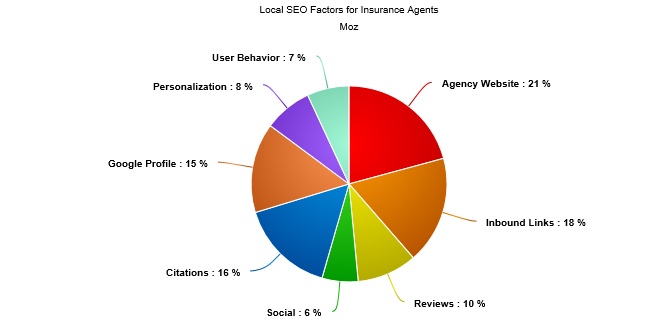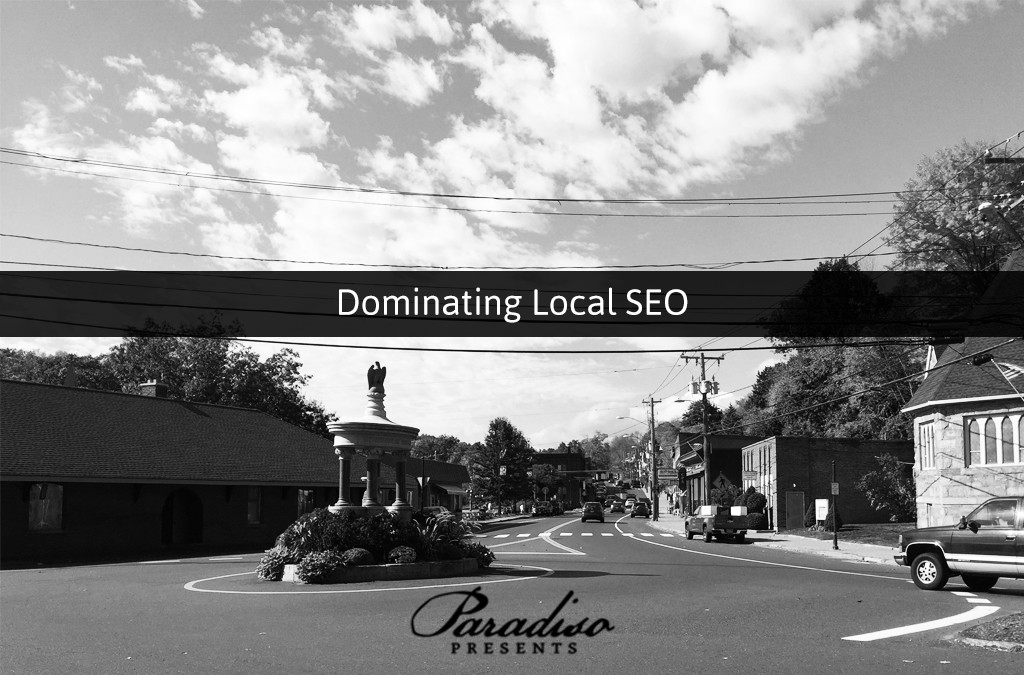SEO is always a hot topic when it comes digital marketing, and it’s something that we certainly aren’t shy to at our agency, Paradiso Insurance. If you’re an insurance agent or broker who is new to SEO, it stands for search engine optimization. This determines how well you will show up in Google’s search results, because we all know we’d love to be the first on the list when someone searches for insurance. While you may not be the first to show up on a national basis, there are certain efforts we can take that can directly affect your local SEO, or how well you show up when members of your hometown and community search for insurance on the web. While SEO can be complicated, complex, and constantly updating, there are certain measures that we can take to ensure we are a step ahead of our competition when it comes to how we show up in Google search results.
Before we discuss the strategy behind our approach though, let’s take a look at what factors you should be looking at that directly affect your agency’s SEO. Moz, a trusted SEO company, conducts a yearly survey to figure what the local search ranking factors are (you can view the 2015 survey results here). With this survey, we have discovered that each of the following areas directly affects your SEO, and how much they affect your SEO as well:

With that being said, let’s go over a few of our strategies that we use to help our SEO with each of these areas individually, so that your agency can generate more leads online.
Agency Website
Your agency website is the one factor that affects your local SEO the most. When people search for insurance within your community, the first thing Google looks for is agencies that have websites set up, as well as what details are included on those sites, and also whether or not the information you put out online is accurate. Google automatically pulls information from the web on your business, but they cross reference the data they’ve obtained with what’s listed on your website, including your phone number, location, products and services that your agency takes care of, and more.
Takeaways:
- Be sure to include your agency’s city and state on your website, and on multiple pages
- Make sure your contact information matches Google’s records, and be sure to include that frequently on your website as well, with your agency phone number in the upper right hand corner of each page
- Be sure that all products and services that your agency can handle area included on your website
Inbound Links
What are inbound links exactly? These include and text or image links on other websites that link users to your website. For example, if someone was on one of our partner’s websites and they found a link for Paradiso Insurance, this would be considered an inbound link. Inbound links can give you credibility online, but there are a few things to keep in mind. Links are more credible when they are from a trusted source, and it’s not always easy to obtain an inbound link. Here’s a few other things to keep in mind.
Takeaways:
- The quality of an inbound link is much more important than the quantity of your inbound links
- Links from websites that are based within your community will help your local search results
- Avoid cheap link-building services; at the end of the day, they don’t work efficiently
Citations
Citations are when someone makes reference to or mentions your insurance agency online. It could be with your agency name, or your phone number, or even your address being listed on another website. When Google determines who should have the strongest SEO, they also consider what other local businesses have to say about your agency in their mentions.
Takeaways:
- Consistency is key with citations; the more you interact with your local community, the stronger your SEO will be
- If your agency has ever relocated, be sure to have your contacts update any listings of your old address online
Your Agency’s Google Profile
Have you claimed your business on Google yet? If not, I’d suggest taking a peek at this quick article on how. Your business can only have one owner on Google, so it’s important that you claim your business before someone else tries to. Once you do, you can customize the information that Google shows in your business listing, as well as branch out and create a Google+ profile for your agency as well. Overall, taking this steps will directly help your SEO.
Takeaways:
- Keep your contact information on your Google+ profile consistent with everywhere else it shows up online
- Get detailed when it comes to answering questions that Google asks you about your agency during your set up process
Online Reviews
Google takes a look at what your network is saying about you when they consider SEO. Whether it’s on your website directly, through a third party platform such as Yelp or Angie’s List, or it’s on your agency’s social media, Google is watching for your agency’s reviews.
Takeaways:
- Don’t be shy when it comes to asking your network for reviews, especially from your most loyal customers
- Don’t make your own fake reviews or pay a third party service to make them for you; this will hurt you in the long run
Let’s Get Social
Yes, Google even watches your agency in the social world. The more active you are, the better, because Google can sense businesses that have more followers on social media, especially Google+.
Takeaways:
- Don’t buy likes, fans, or followers from services because Google know that they aren’t authentic
- Don’t do social just as an SEO tool, but be sure to actively engage with your audience; you can get started by checking out our article on social media
User Behavior and Search Results Personalization
The last small chunks of the SEO pie chart is user behavior and search results personalization, which is proof that Google’s artificial intelligence keeps a close eye on us online. The way that users experience your agency online, meaning their overall website user experience, is important to Google. Not only that, but if you make it more convenient to find and interact with your agency online, your SEO will be stronger overall as well. Not to mention, Google knows whether you’re visiting your website versus someone outside of your home or office, because of its location tracking services. Getting authentic visits and interactions with your agency online will help your SEO at the end of the day.
Takeaways:
- Google checks the number of people who request directions to your agency online, so be sure that’s readily available
- Don’t short change your agency website’s budget, because a poorly designed or inefficient website will hinder your SEO
- Be sure to include call to actions on your agency website, so that your leads will close on your website instead of going back to search results to click on your competition
If you’re looking for even more tips on how your agency can boost your rankings online, be sure to check out this info-graphic put together by our friends at seoreseller.com!






I wanted to compliment you on your blogs. They are informative, digestible and very well written. I shared them all on our G+ page 🙂 Great advice and how to for agencies that may struggle with resource constraints and the “why.” Especially loved the community based marketing one. You are right, small insurance agencies do have an advantage and you clearly articulated it.
Thank you very much for the feedback and shares Annie, we are happy to help
This article is wonderfully written on all the aspects of local SEO for the uses of commercial business. Most of the time from a business point of view, people ignore local SEO. But the importance of local SEO for every business is so high. Really found the content very useful.